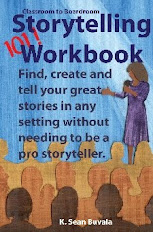Crafting a story is an essential skill for both beginning and experienced tellers. Crafting, much like sculpting, involves knowing what to trim away and what to keep.
For storytellers, our sculpting tools should include the red “cross it out” pen. In my youth, I once heard an old comedy album where the comedian said, “When you are trying to tell a story, try having a point. It makes it so much more interesting for an audience.”
I’ve attended several storytelling events of late that bring that old comedy routine to mind.
I’ve wanted to hand the tellers a giant red pen, hoping they’d cut out, cross out and eliminate the bloatedness of their tales.
Although it’s not always possible to have a clear-cut point in telling folktales or world myths, storytellers need to know “why” they are telling any particular story. If not, stories end up as rambling and meandering exercises in hearing ourselves talk. When that happens, the stories lose interest, and our audiences just lose interest.
Doing the red pen routine with personal tales is easier, so let’s begin there.
First, understand that storytelling is an audience-centered art form. It’s not a form of therapy for the storyteller.
Grab yourself a piece of paper and do this exercise with me.
First, choose a personal tale from your repertoire.
Then imagine the type of audience you’ll be telling to and with.
With those thoughts in mind, ask yourself, "why am I telling the story?" What is my point?
Identify this first thought, this singular crystal-clear point, and write it across the top of the paper. Use large, bold letters.
Underneath those big bold letters, write an outline your story. What’s first, second, third.....sixth, etc? Try to include all the elements of your typical telling of that story, including those tangential side trips you might be normally inclined to make.
Now comes the step so many tellers are unwilling to make. Grab your red pen. Re-read your main point. Go down your outline and ask yourself for each numbered item, “Does this item illustrate or lead to my main point?” If it does not, cross it out.
This is where some storytellers start reaching for the oxygen mask. “But, what you want me to cut out is (funny, cute, touching, meaningful, pretty, insightful, witty, makes my grandma laugh, tells people I love dogs, will save the world, etc). I couldn’t cut out that part.”
Yes, you could.
Yes, you should.
If it does not move your story towards your main point for the audience you are addressing, draw a line and drop it from your story. Most likely, the parts you’ve redlined are or could become stories in their own way.
The process I have just described is a good exercise to do with your storytelling coach. Ask that person to help you identify and redline the excessive parts of your story that drag down your work. One of the challenges with storytelling as an art form is our excessive focus on internal (“How does your storytelling make you feel?”) coaching, so it may be hard to find a mentor that will be honest with you.
You should assure your coach that having an opinion is okay.
This ability to redline one’s work to focus on the audience's needs is essential for good storytelling. Tellers unwilling to redline their stories just leave me wishing for the door.
A storyteller who tells a story that has been redlined and crafted leaves me wishing for more of their craft. Isn’t that the goal- building a love for stories and storytelling in our audiences
 I've just launched the "Welcome Back, Dragon Handlers" site for my 'back to school" or teacher professional development days. You can find this site at www.DragonHandlers.com. You can hear a 4 minute clip of me speaking to a teachers' convocation as well as learn more about this very specialized keynote for educational events. We've priced this as very affordable for any school district gathering. Please come take a look.
I've just launched the "Welcome Back, Dragon Handlers" site for my 'back to school" or teacher professional development days. You can find this site at www.DragonHandlers.com. You can hear a 4 minute clip of me speaking to a teachers' convocation as well as learn more about this very specialized keynote for educational events. We've priced this as very affordable for any school district gathering. Please come take a look. 









